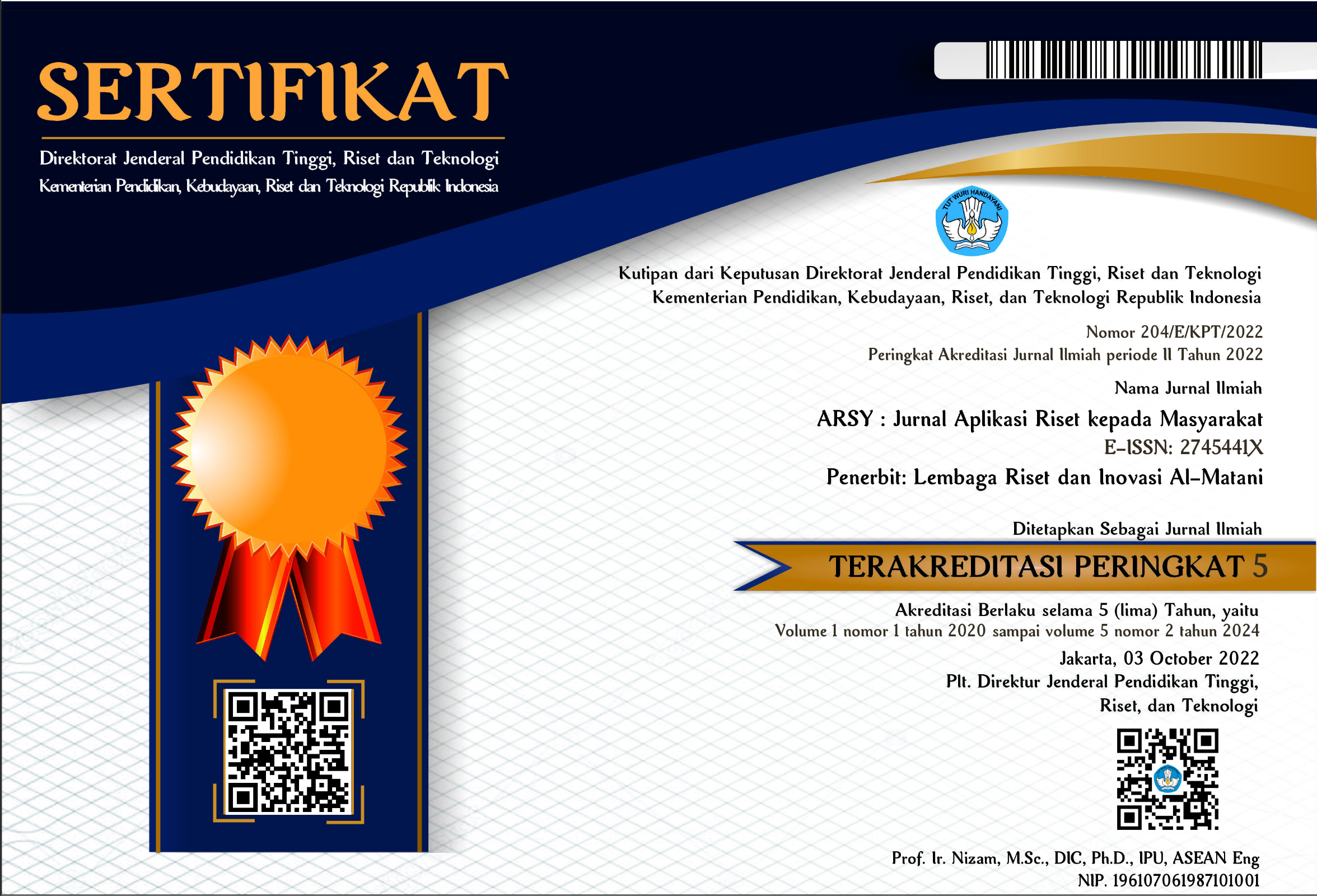Coaching Clinic Penulisan Artikel Jurnal Bereputasi bagi Dosen Fakultas Ilmu Pendidikan Universitas Negeri Padang Tahap I
DOI:
https://doi.org/10.55583/arsy.v3i2.438Keywords:
article, lectures, coaching clinic, reputable journalAbstract
The focus of this community service includes the ability of lecturers to write reputable journal articles. This community service aims to improve: 1) lecturers' understanding of writing good articles so that they can be published in reputable journals; 2) lecturer skills in writing good articles so that they can be published in reputable journals; and 3) awareness of lecturers about the importance of writing good articles so that they can be published in reputable journals. The methods used so that the purpose of this service can be carried out properly include: 1) coaching clinic through zoom meetings by providing some material about writing reputable journal articles; 2) Focus Group Discussion (FGD) on materials for writing articles in reputable journals; and 3) assisting in writing articles for reputable journals, tracing reputable journals and submitting articles that have been revised by the author from reviewers. This community service activity reveals the fact that: 1) the implementation of coaching clinic activities and discussions about writing reputable journal articles; 2) the implementation of mentoring activities for writing reputable journal articles; and 3) there is an increase in lecturers' knowledge in writing reputable journal articles. So that through this activity it is hoped that it will have positive implications in writing reputable journal articles for lecturers at the UNP Faculty of Education in particular and for lecturers from other faculties in general.
References
Bollenbach, K. L., Powell, E. D., Moore, S. L., & Groves, J. F. (2014). Building A Healthy Online Student Community Through Education Environment Design. ASEE Annual Conference and Exposition, Conference Proceedings. https://doi.org/10.18260/1-2--20130
Cleland, J., McKimm, J., Fuller, R., Taylor, D., Janczukowicz, J., & Gibbs, T. (2020). Adapting to the impact of COVID-19: Sharing stories, sharing practice. Med Teach, 42(7), 772–775. https://doi.org/10.1080/0142159X.2020.1757635
Harasim, L. (2017). Learning Theory and Online Technologies (2nd ed.). Routledge. https://doi.org/https://doi.org/10.4324/9781315716831
Keengwe, J., & Kidd, T. T. (2010). Towards Best Practices in Online Learning and Teaching in Higher Education. MERLOT Journal of Online Learning and Teaching, 6(2), 533–541. https://jolt.merlot.org/vol6no2/keengwe_0610.pdf
Lee, L., & Markey, A. (2014). A study of learners’ perceptions of online intercultural exchange through Web 2.0 technologies. ReCALL, 26(3). https://doi.org/https://doi.org/10.1017/S0958344014000111
Moore, M. G., & Kearsley, G. (2020). Distance education: a systems view of online learning. Educational Review, 72(6), 800. https://doi.org/https://doi.org/10.1080/00131911.2020.1766204
Permana, S. A., Hartanto, S., Lia, A., & Magiman, M. M. (2021). Webinar Technology-Based Science Article Writing Training. Journal of Physics: Conference Series, 1823(1). https://doi.org/10.1088/1742-6596/1823/1/012040
Reyna, J., Todd, B., & Hanham, J. (2020). A Practical Framework to Design Educational Webinars in the Age of COVID-19. Proceedings of EdMedia + Innovate Learning 2020, July, 265–271. https://www.learntechlib.org/p/217312
Rummler, G. A., & Brache, A. P. (1988). The systems view of human performance. Training, 25(9), 45–53. https://eric.ed.gov/?id=EJ377133
Stošić, L. (2015). The importance of educational technology in teaching. International Journal of Cognitive Research in Science, Engineering and Education, 3(1), 111–114. https://doi.org/10.23947/2334-8496-2015-3-1-111-114
Yang, J., Kinshuk, K., Yu, H., Chen, S. J., & Huang, R. (2014). Strategies for Smooth and Effective Cross-Cultural Online Collaborative Learning. Journal of Educational Technology & Society, 17(3). http://www.learntechlib.org/p/156091/
Yuan, J., & Kim, C. (2014). Guidelines for facilitating the development of learning communities in online courses. J. Comput. Assist. Learn., 30(3), 220–232. https://doi.org/https://doi.org/10.1111/jcal.12042









